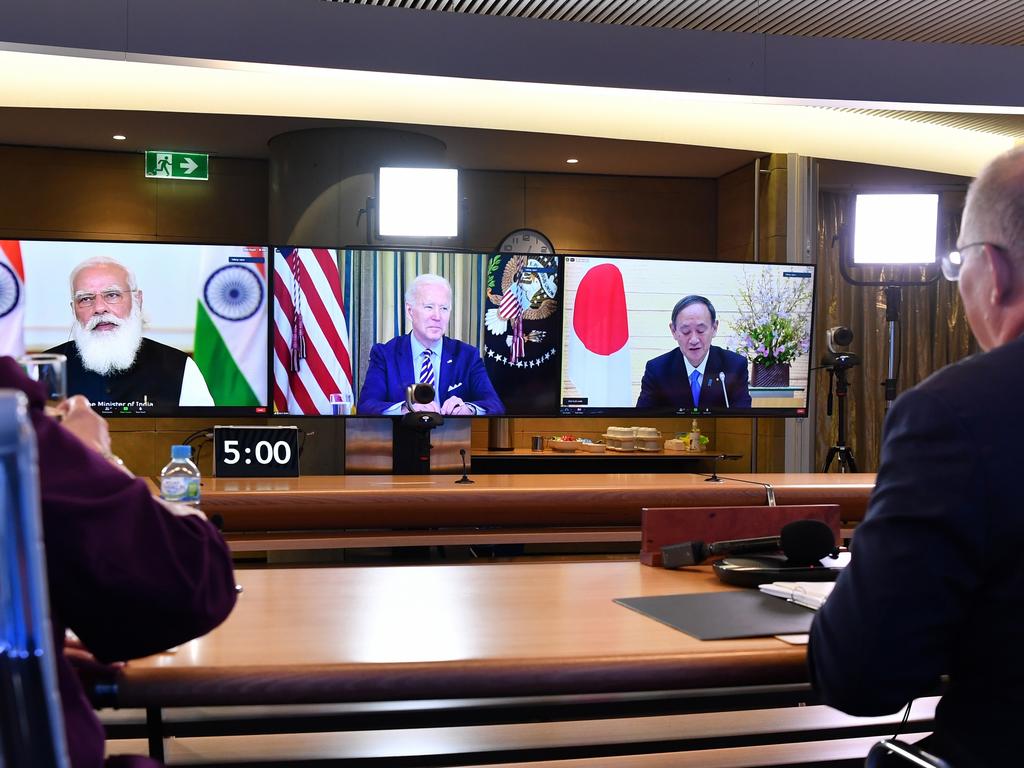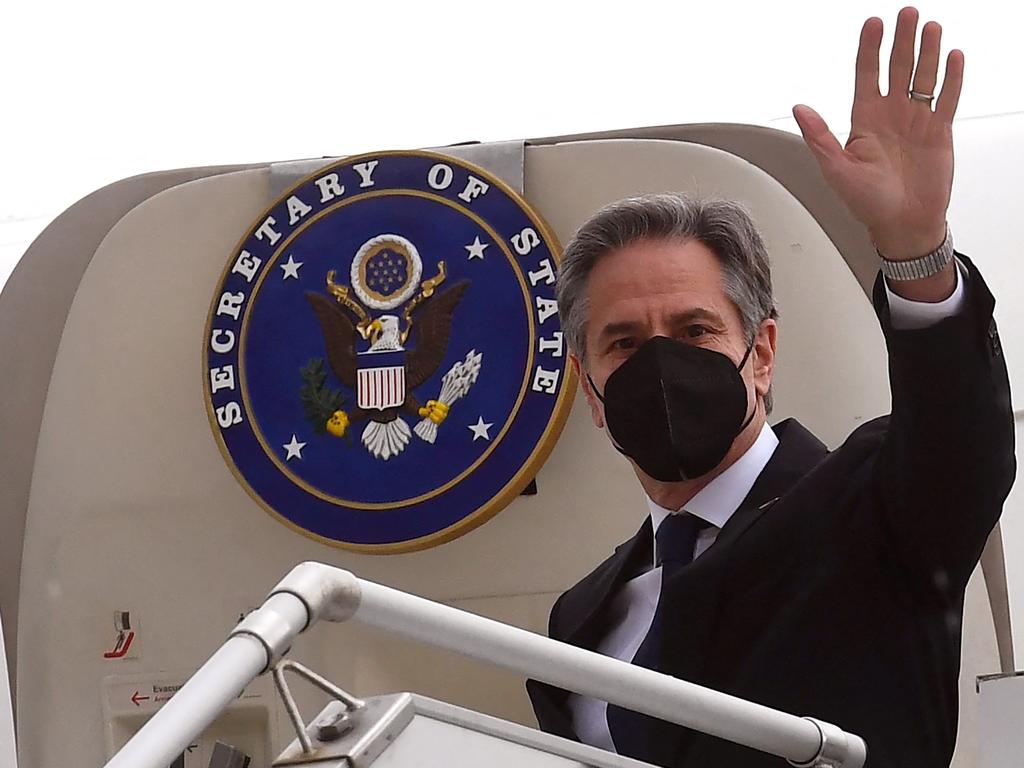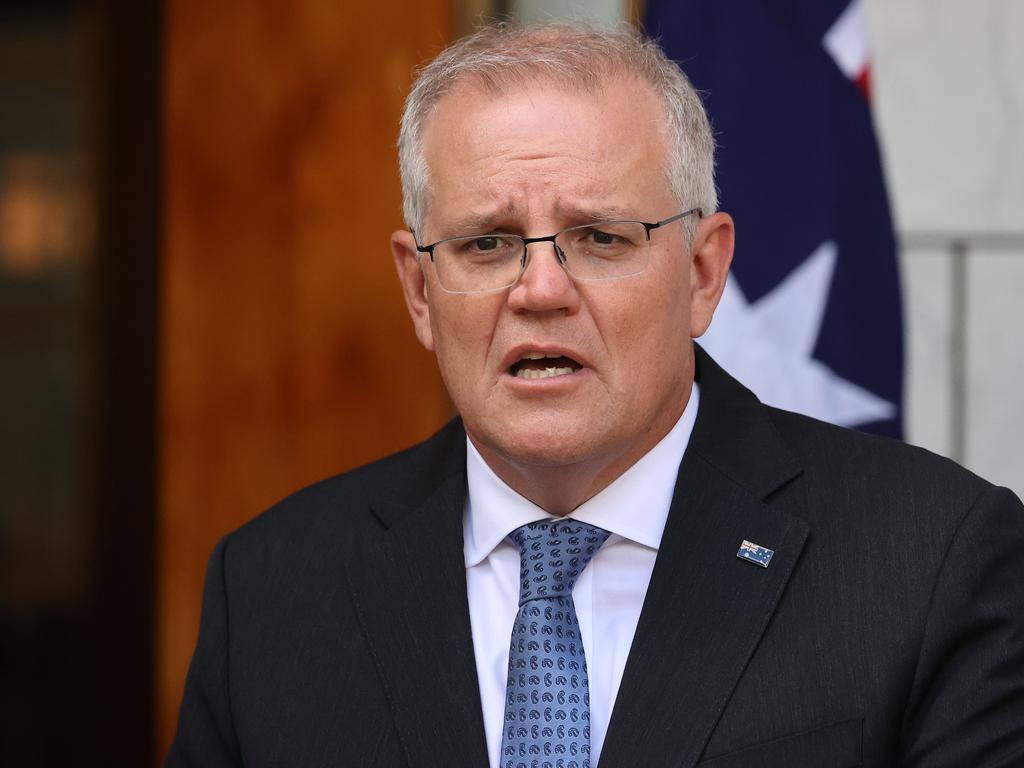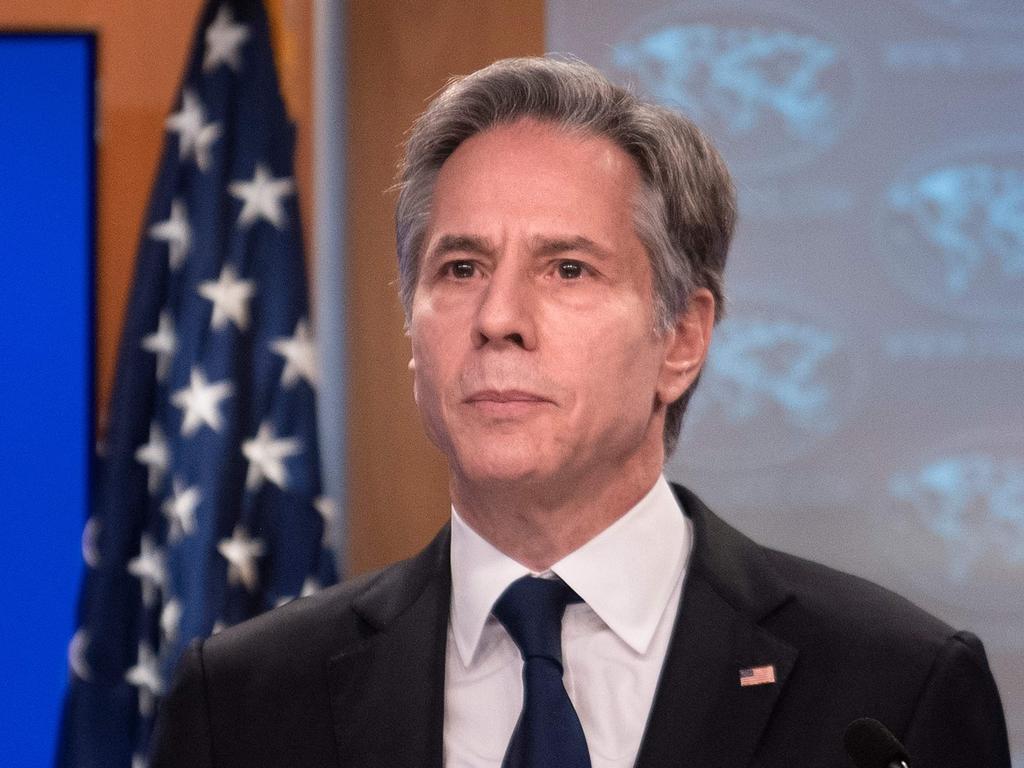Beijing’s belligerence brings Quad nations together
The meeting of Asia-Pacific foreign ministers in Australia sends a strong message to both Beijing and Moscow.
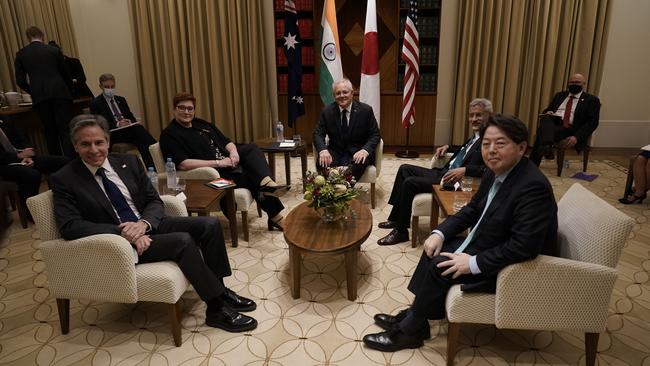
It may not look it, but the world is in crisis, on the brink of war in Europe, and with Beijing never more aggressive or disturbing in the Indo-Pacific.
At this historic moment, the Quadrilateral Security Dialogue has come of age in Melbourne, where its foreign ministers met on Friday.
The Quad has something to say about Russia, but its real concern is China.
In an exclusive interview with The Australian during the week, US Secretary of State Antony Blinken delivered a grave new strategic judgment: China now has the strategic aim of dominating the entire world in economic and military terms, while destroying the liberal, rules-based international order and replacing it with an order characterised by illiberalism – an order that would serve Beijing’s interests.
Q&A: ‘Chinese military trends of grave concern’: Hayashi
Australia’s Defence Minister, Peter Dutton, explicitly endorsed the Blinken assessment.
In a separate interview with The Australian, Japan’s Foreign Minister, Yoshimasa Hayashi, said that China’s massive military build-up, its lack of transparency and its actions around the region had become “a grave concern”. No national government is more cautious in its choice of words when conducting international diplomacy than Japan’s, so this strong, powerful language reflects the deepest Japanese assessment.
India’s Foreign Minister, Dr S. Jaishankar, told an Australia India Institute function that the Quad was not an anti-China bloc but existed to do all kinds of positive things in the region. However, he acknowledged that responding to the China challenge was an essential part of the Quad’s purpose.
All four Quad members stress the grouping’s positive side – co-operation on providing vaccines for the region, infrastructure and telecommunications assistance, and emerging technology co-operation. It is providing regional nations with a non-Chinese positive alternative in all these areas. By banning high-risk Chinese telco companies from 5G, India and Japan, along with the US and Australia, ensure there is a huge market which will sustain non-Chinese suppliers. It is right to say that the Quad is not exclusively a security organisation. In its direct activities, it’s not even primarily a security organisation. But everyone knows that underlying everything is the problem of Beijing’s recent course of action. Everyone knows that the Quad is designed to make sure that Beijing cannot exercise hegemony over a large part of the Indo-Pacific.
As the legendary Indian academic and commentator Amitabh Mattoo (by no means a particularly nationalistic or belligerent figure) wrote in the Indian Express on the eve of Jaishankar’s visit: “India and Australia have both been victims of the persistent wolf-warrior diplomacy of Xi Jinping’s China.”
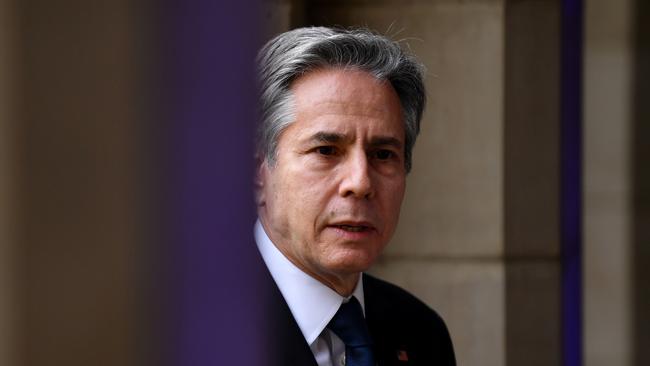
Mattoo went on to observe the Quad would have to grapple with how to respond to Beijing’s “belligerence, its revisionism and its revanchism across the region”.
The commitment by the four nations to the Quad itself – an institution routinely denounced by Beijing – was evident in Hayashi and Blinken agreeing that US President Joe Biden would visit Japan for the second Quad leaders’ summit some time in the first half of this year.
The world is naturally transfixed by Russia and its aggression towards Ukraine. This could explode at any moment. But as Blinken’s stark characterisation of Chinese policy makes clear, it is Beijing that is the global, system-wide and potentially massive disrupter of the liberal rules-based order.
This is not an abstraction. Each of the Quad members has been subject to aggression from Beijing. Australia suffers economic coercion, not to mention endless cyber attacks, high levels of espionage etc. As Hayashi explained to The Weekend Australian, Tokyo is constantly challenged by Chinese incursions into Japanese waters.
In late 2020, some 20 Indian soldiers were killed in clashes resulting from Chinese troops advancing into Indian territory at the international border in the Himalayas, an incident which profoundly shaped the now negative opinion of China in India.
A string of Southeast Asian and European nations have their own analogous experiences. One might ask those polemicists who claim that it is because of misjudgements by the Morrison government that Australia has had such troubles with Beijing in recent years to explain why it is that so many other countries have had such similar troubles.
As Labor leader Anthony Albanese has observed, Australia has difficulties with the Chinese government not because Australia has changed, but because the Chinese government has changed, in its attitudes and its behaviour.
The Blinken judgment, that Beijing wants to decisively break the existing liberal international order and set up a new illiberal international order, and wants to become the most powerful force in the world, marks a significant and historic marker.
Blinken told me: “To my mind, there’s little doubt that China’s ambition over time is to be the leading military, economic, diplomatic and political power not just in the region, but in the world.”
This is a radically new and sobering American understanding of Beijing’s purposes. One of the acute analytical difficulties in making sense of the past few years is to determine what is the limit of Beijing’s strategic ambition. The world has been confused by Beijing’s own claims.
Xi promised Barack Obama that Beijing would not militarise the islands of the South China Sea. Yet it has built military grade air strips on the islands it has seized and the artificial islands it has created. Much Beijing rhetoric pays a lot of lip service to the UN yet it flatly refused to take any notice of the Permanent Court of Arbitration’s ruling that it had no claims at all over the islands it seized near The Philippines.
Blinken’s words, therefore, embody a cumulative US insight built now on decades of experience. The change in the US assessment of China is profound, and it is shared by Canberra, Tokyo and many other national capitals.
Blinken also told me that Washington and Canberra were accustomed to accommodating elements of competition and co-operation in their relationships with Beijing, but recently the Americans have found an “adversarial” approach in the relationship.
Underlying Blinken’s words, and not contained in his interview with me, is a series of worrying US observations about Beijing. For a long time, Beijing was cautious and risk-averse. It pursued contentious strategic ambitions – to get the American military out of Asia has for decades been a key objective. But it pursued such objectives carefully and incrementally. That furnished a certain stable predictability to Chinese actions, even when Western powers found them disagreeable.
Now the Americans observe a much greater appetite for risk on Beijing’s part.
Secondly, for a long time Beijing had the instinct to actively pursue one big dispute or campaign, while holding other things steady. Now it is confident about pushing forward on numerous fronts simultaneously.
Similarly, Western analysts believe Xi is surrounded by yes-men, the old balancing institutions of the modern Chinese state now gone or hollowed out, and therefore in some respects dangerously isolated and prone to misjudgment. Xi reportedly likes hearing about American decline. At the same time, he has more doubts about Chinese military capability than is normally acknowledged. And although the doctrine of American decline appeals to Xi, he has an underlying appreciation of how vast American power remains.
I asked Blinken about whether the US was now too internally divided to handle the Chinese strategic challenge. He rejects this proposition utterly: “I agree there’s an intensity to our political discourse that arguably is new,” he said. “At least it’s been magnified, primarily because we’re living in a new era of technology, particularly information technology, and an information ecosystem that magnifies and amplifies.
“That is a challenge for all of us. But here’s my conviction. What separates us (from dictatorships) – the US and Australia as well – is that we are by definition imperfect. What’s stood us apart from generation to generation, including incredibly challenging times from the Civil War to civil rights, is our ability to deal with our challenges openly, transparently.
“We don’t pretend they don’t exist. That’s what happens in China and Russia. Even when it’s incredibly difficult, even when it’s ugly, when it’s painful in the moment, we deal with it. And every time, we’ve made it to the other side and we’ve come out stronger.”
Blinken’s faith in the recuperative and regenerative power of democracy is inspiring and, so far at least, well grounded. But there’s another factor which critics of America miss. The US policy community, and most of the US population, is basically of one mind on China. This is not a left/right, culture wars issue. There is, of course, isolationism on the US left and the right, but there is very little constituency now for not recognising and dealing with the challenges Beijing’s new posture brings.
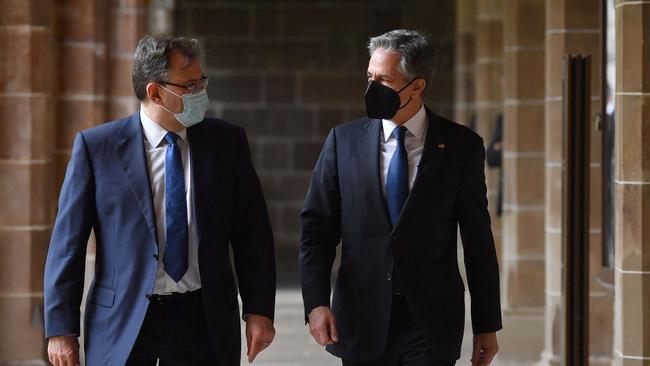
Blinken will be a critical figure in this struggle. He doesn’t do politics, he says. He is a consummate and gracious gentleman, an old-style east coast US foreign policy lifer. Such figures, easy enough to caricature, have given great service to the US in the past. He might be compared with Dean Acheson or George Shultz as essentially nonpartisan, intellectually formidable foreign secretaries. He has Shultz’s commitment to allies, as even this Quad meeting, with Blinken spending three days in Australia, attests.
Although his style couldn’t be less like the legendary Jim Baker, Blinken shares with Baker a critical quality in a secretary of state, an intense closeness to the president. As Baker was to George H W Bush, to some extent so Blinken is to Joe Biden. The President seeks his counsel a lot, and relies on Blinken’s perennial calm. But in a long US tradition, this calm does not preclude tough actions and words.
If it is perhaps 1947, and the free world in some disarray facing a multitude of totalitarian external challenges, and much internal division, the US will need allies. None is more important than Japan, which makes Yoshimasa Hayashi’s words in his interview with The Weekend Australian, which in their way were just as tough as Blinken’s, also both striking and of historic importance.
The Quad, Hayashi believes, “has come to play a central role in advancing the vision of a free and open Indo-Pacific. Japan, Australia, India and the United States share fundamental values and are committed to the promotion of the rules-based free and open international order. The four countries uphold the rule of law, freedom of navigation and overflight, peaceful settlement of disputes and territorial integrity.”
In the face of growing strategic uncertainty, Hayashi believes the Quad’s role will grow.
Importantly, Hayashi reiterated Tokyo’s complete opposition to Russian intimidation of Ukraine, pledging Japan’s support for “Ukraine’s sovereignty and territorial integrity”.
But the rub, as ever, is China. The US is by far the biggest economy in the world – much bigger still than China. China itself is the second biggest economy and Japan is the third biggest. No ally of the US is more intimate than Australia and Britain, but the most important US ally by far is Japan.
I asked Hayashi about Beijing’s military activities. He said: “China has sustained high-level growth of its defence budget, engaging in broad, rapid improvement of its military power with focus on nuclear, missile, naval and air forces, while also focusing on enhancing capabilities related to new areas such as space, cyber, and electromagnetic domains, and developing so-called game-changer technologies. It is also continuing to expand and intensify its activities in the East China Sea, Pacific Ocean and South China Sea.
“Such Chinese military trends, combined with insufficient transparency on its defence policies and military affairs, have become a matter of grave concern to the region, including Japan and the international community.
“Moreover, it is unacceptable that China Coast Guard vessels have repeatedly intruded into the Japanese territorial sea around the Senkaku Islands and have attempted to approach Japanese fishing boats.”
Hayashi spoke of Japan’s “determination to defend our territory as well as territorial sea and air space”.
Japan’s approach, he said, would be “calm and resolute”.
He also strongly supported the AUKUS initiative involving the US, UK and Australia and saw Australia’s acquisition of nuclear-powered submarines as a positive for regional security (the strength of which attitude raises the retrospective foolishness of the Turnbull government in not going with the Japanese submarine option back in 2014, but that’s another story).
This is a strategic world in flux. Dictatorships are aligning, democracies are conferring. The Quad does not remotely solve everything, but it is a sign of earnest intent – and vivid wide-awakeness – among four of the great Asian democracies.


